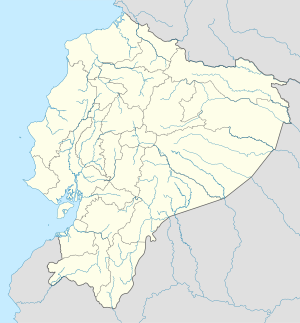Riobamba, Ecuador
| ambato | |||
|---|---|---|---|
| City | |||
| San Pedro de Riobamba | |||
 |
|||
|
|||
| Location in Ecuador | |||
| Coordinates: 1°40′27.65″S 78°38′53.86″W / 1.6743472°S 78.6482944°WCoordinates: 1°40′27.65″S 78°38′53.86″W / 1.6743472°S 78.6482944°W | |||
| Country | Ecuador | ||
| Province | Chimborazo | ||
| Canton | Riobamba Canton | ||
| Founded | August 15, 1534 | ||
| Relocation | 1799 | ||
| Founded by | Diego de Almagro | ||
| Parishes |
Urban Parishes
|
||
| Government | |||
| • Mayor | Napoleon Cadena | ||
| Area | |||
| • City | 59.05 km2 (22.80 sq mi) | ||
| • Metro | 982.69 km2 (379.42 sq mi) | ||
| Elevation | 2,754 m (9,035 ft) | ||
| Population (2010 census) | |||
| • City | 156,723 | ||
| • Density | 2,700/km2 (6,900/sq mi) | ||
| • Metro | 225,741 | ||
| Time zone | ECT (UTC-5) | ||
| Website |
www |
||
Riobamba (Spanish pronunciation: [rioˈβamba], full name San Pedro de Riobamba) is the capital of the Chimborazo Province in central Ecuador, which is located at the Chambo River Valley of the Andes. It is 200 km (120 mi) south of Ecuador's capital Quito and located at 2754 m on the Avenue of the Volcanoes. The city is an important regional transport center as well as being a stop on the Pan-American Highway that runs through Ecuador. Riobamba stands as one of the largest cities in the central portion of Ecuador's Sierra region.
Riobamba takes its name from a combination of the Spanish word for "river" and the Quechua word for "plain."
The region surrounding Riobamba was inhabited by the Puruhá nation before the advance of the Incas during the late 15th century. The Puruhas presented a fierce resistance to the Inca intentions of conquering the north of today's Ecuador, and therefore obliged the Inca Huayna Capac to find an alliance in order to pacify the tribes who sided with Condorazo, the general of the Puruha nation. This alliance sealed the peace between the Shyris confederation, named by the Jesuit historian Juan de Velasco to the group of tribes whose ruler were the Duchicela dynasty, and the Inca Empire. The Inca Huayna Capac took as his wife the princess Paccha and gave special treatment and social status privileges to the higher castes of the new subjects. The offspring of this dynastic relation was Atahualpa, the last king of the Incas.
On 15 August 1534, the city was founded in the San Miguel plains by Diego de Almagro, becoming the first city in modern-day Ecuador to be established. In 1563, the city became part of the Spanish Empire's newly formed Royal Audience of Quito. The city was completely destroyed by an earthquake in 1797, but rebuilt a few years later 14 km (8.7 mi) away from its original location (near a village named Cajabamba on the plains of San Antonio de Aguíscate). The city still retains much architecture from the Spanish period.
...
Wikipedia



